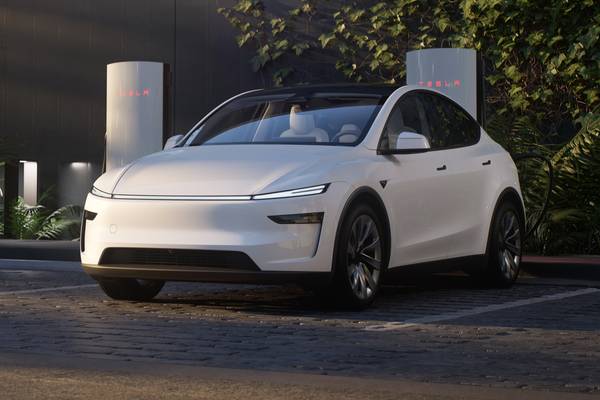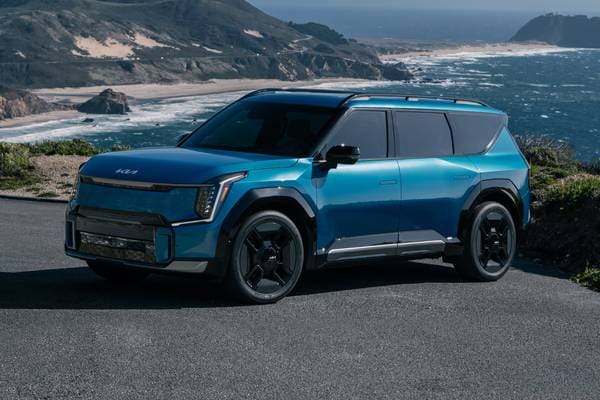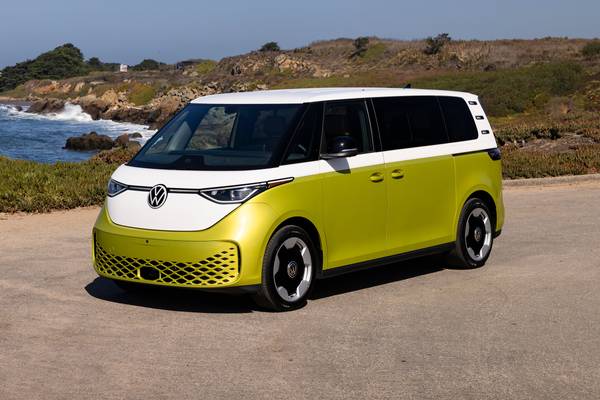Best Electric SUVs of 2025 and 2026
The Edmunds experts test drive electric SUV contenders on our test track and in the real world. Our ratings assess performance, comfort, technology, utility, value and more. How we rank electric SUVs
Best Electric SUVs
The line between SUV and hatchback gets blurry in this segment, but you can count on versatile cargo space and an elevated driving position.
1st

Introduced in 2020
Read full review about2026 Tesla Model Y Long Range
- Edmunds Rating
- 8.7/10
- MSRP
- $44,990 - $59,990
- Edmunds EV Range Edmunds' real-world range test measures the distance an electric vehicle can travel on a full charge. More info
- 327 mi
2nd

Introduced in 2024
Read full review about2025 Kia EV9 GT-Line
- Edmunds Rating
- 8.6/10
- MSRP
- $54,900 - $73,900
- Edmunds EV Range Edmunds' real-world range test measures the distance an electric vehicle can travel on a full charge. More info
- 306 mi
3rd

Introduced in 2022
Read full review about2025 Hyundai IONIQ 5 Limited AWD
- Edmunds Rating
- 8.4/10
- MSRP
- $42,600 - $58,200
- Edmunds EV Range Edmunds' real-world range test measures the distance an electric vehicle can travel on a full charge. More info
- 282 mi
$179/mo lease found!
This exceptionally rare deal is $496 below typical
4th

Introduced in 2025
Read full review about2025 Volkswagen ID. Buzz Pro S Plus 4Motion
- Edmunds Rating
- 8.3/10
- MSRP
- $59,995 - $69,995
- Edmunds EV Range Edmunds' real-world range test measures the distance an electric vehicle can travel on a full charge. More info
- 262 mi
5th

Introduced in 2024
Read full review about2025 Chevrolet Equinox EV LT FWD
- Edmunds Rating
- 8.2/10
- MSRP
- $33,600 - $43,400
- Edmunds EV Range Edmunds' real-world range test measures the distance an electric vehicle can travel on a full charge. More info
- 356 mi
6th

Introduced in 2021
Read full review about2025 Ford Mustang Mach-E Extended Range AWD
- Edmunds Rating
- 8.2/10
- MSRP
- $37,995 - $54,495
- Edmunds EV Range Edmunds' real-world range test measures the distance an electric vehicle can travel on a full charge. More info
- 304 mi
7th

Introduced in 2022
Read full review about2024 Kia EV6 GT-Line
- Edmunds Rating
- 8.0/10
- MSRP
- $42,600 - $61,600
- Edmunds EV Range Edmunds' real-world range test measures the distance an electric vehicle can travel on a full charge. More info
- 261 mi
8th

Redesigned in 2023
Read full review about2025 Kia Niro EV
- Edmunds Rating
- 7.9/10
- MSRP
- $39,600 - $44,600
- Edmunds EV Range Edmunds' real-world range test measures the distance an electric vehicle can travel on a full charge. More info
- 280 mi
9th

Introduced in 2021
Read full review about2025 Volkswagen ID.4
- Edmunds Rating
- 7.8/10
- MSRP
- $39,995 - $57,295
- Edmunds EV Range Edmunds' real-world range test measures the distance an electric vehicle can travel on a full charge. More info
- 299 mi
$329/mo lease found!
This exceptionally rare deal is $346 below typical
10th

Introduced in 2024
Read full review about2025 Honda Prologue Elite AWD
- Edmunds Rating
- 7.7/10
- MSRP
- $47,400 - $57,900
- Edmunds EV Range Edmunds' real-world range test measures the distance an electric vehicle can travel on a full charge. More info
- 320 mi
$209/mo lease found!
This exceptionally rare deal is $466 below typical
11th

Introduced in 2024
Read full review about2025 Chevrolet Blazer EV RS
- Edmunds Rating
- 7.6/10
- MSRP
- $44,600 - $60,600
- Edmunds EV Range Edmunds' real-world range test measures the distance an electric vehicle can travel on a full charge. More info
- 320 mi
12th

Introduced in 2023
Read full review about2025 Subaru Solterra
- Edmunds Rating
- 7.5/10
- MSRP
- $38,495 - $45,495
- Edmunds EV Range Edmunds' real-world range test measures the distance an electric vehicle can travel on a full charge. More info
- 249 mi
12th

Introduced in 2023
Read full review about2025 Toyota bZ4X
- Edmunds Rating
- 7.5/10
- MSRP
- $37,070 - $43,880
- Edmunds EV Range Edmunds' real-world range test measures the distance an electric vehicle can travel on a full charge. More info
- 227 mi
14th

Redesigned in 2025
Read full review about2025 MINI Countryman SE All4
- Edmunds Rating
- 7.4/10
- MSRP
- $45,200 - $48,400
- Edmunds EV Range Edmunds' real-world range test measures the distance an electric vehicle can travel on a full charge. More info
- 218 mi
15th

Introduced in 2023
Read full review about2025 Nissan ARIYA
- Edmunds Rating
- 7.2/10
- MSRP
- $39,770 - $54,370
- Edmunds EV Range Edmunds' real-world range test measures the distance an electric vehicle can travel on a full charge. More info
- 265 mi
$219/mo lease found!
This exceptionally rare deal is $456 below typical
16th

Introduced in 2024
Read full review about2025 Jeep Wagoneer S
- Edmunds Rating
- 7.1/10
- MSRP
- $65,200 - $70,200
- Edmunds EV Range Edmunds' real-world range test measures the distance an electric vehicle can travel on a full charge. More info
- 276 mi
$369/mo lease found!
This exceptionally rare deal is $306 below typical
Best Luxury electric SUVs
Given the popularity of luxury SUVs, it's no surprise that luxury electric SUVs are on the rise. Versatile interior space, cutting-edge technology and impressive power are par for the course.
1st

Introduced in 2022
Read full review about2026 BMW iX xDrive50
- Edmunds Rating
- 8.4/10
- MSRP
- $75,150 - $111,500
- Edmunds EV Range Edmunds' real-world range test measures the distance an electric vehicle can travel on a full charge. More info
- 377 mi
2nd

Introduced in 2023
Read full review about2026 Genesis Electrified GV70
- Edmunds Rating
- 8.4/10
- MSRP
- $64,380 - $75,350
- Edmunds EV Range Edmunds' real-world range test measures the distance an electric vehicle can travel on a full charge. More info
- 255 mi
3rd

Introduced in 2023
Read full review about2025 Genesis GV60 Performance
- Edmunds Rating
- 8.4/10
- MSRP
- $52,350 - $69,900
- Edmunds EV Range Edmunds' real-world range test measures the distance an electric vehicle can travel on a full charge. More info
- 274 mi
4th

Redesigned in 2025
Read full review about2025 Rivian R1S
- Edmunds Rating
- 8.4/10
- MSRP
- $75,900 - $105,900
- Edmunds EV Range Edmunds' real-world range test measures the distance an electric vehicle can travel on a full charge. More info
- 330 mi
5th

Introduced in 2023
Read full review about2025 Mercedes-Benz EQE 350+ SUV
- Edmunds Rating
- 8.1/10
- MSRP
- $77,900 - $109,600
- Edmunds EV Range Edmunds' real-world range test measures the distance an electric vehicle can travel on a full charge. More info
- 345 mi
6th

Introduced in 2025
Read full review about2025 Polestar 3 Launch Edition
- Edmunds Rating
- 8.1/10
- MSRP
- $73,400 - $84,900
- Edmunds EV Range Edmunds' real-world range test measures the distance an electric vehicle can travel on a full charge. More info
- 303 mi
7th

Introduced in 2016
Read full review about2025 Tesla Model X Long Range
- Edmunds Rating
- 8.1/10
- MSRP
- $84,990 - $99,990
- Edmunds EV Range Edmunds' real-world range test measures the distance an electric vehicle can travel on a full charge. More info
- 294 mi
8th

Introduced in 2023
Read full review about2025 Cadillac LYRIQ
- Edmunds Rating
- 8.0/10
- MSRP
- $58,595 - $67,495
- Edmunds EV Range Edmunds' real-world range test measures the distance an electric vehicle can travel on a full charge. More info
- 319 mi
9th

Introduced in 2025
Read full review about2025 Volvo EX90 Twin Motor Performance
- Edmunds Rating
- 8.0/10
- MSRP
- $79,995 - $89,845
- Edmunds EV Range Edmunds' real-world range test measures the distance an electric vehicle can travel on a full charge. More info
- 310 mi
10th

Redesigned in 2024
Read full review about2025 Porsche Macan 4 Electric
- Edmunds Rating
- 8.0/10
- MSRP
- $75,300 - $105,300
- Edmunds EV Range Edmunds' real-world range test measures the distance an electric vehicle can travel on a full charge. More info
- 352 mi
11th

Introduced in 2025
Read full review about2025 Volvo EX40 Twin Motor
- Edmunds Rating
- 7.9/10
- MSRP
- $52,500 - $60,750
- EPA Range
- 296 mi
12th

Introduced in 2019
Read full review about2024 Jaguar I-PACE
- Edmunds Rating
- 7.9/10
- MSRP
- $72,000
- Edmunds EV Range Edmunds' real-world range test measures the distance an electric vehicle can travel on a full charge. More info
- 262 mi
13th

Introduced in 2022
Read full review about2024 Volvo C40 Recharge
- Edmunds Rating
- 7.8/10
- MSRP
- $53,600 - $60,550
- Edmunds EV Range Edmunds' real-world range test measures the distance an electric vehicle can travel on a full charge. More info
- 252 mi
14th

Introduced in 2022
Read full review about2025 Audi Q4 55 e-tron
- Edmunds Rating
- 7.8/10
- MSRP
- $49,800 - $61,800
- Edmunds EV Range Edmunds' real-world range test measures the distance an electric vehicle can travel on a full charge. More info
- 261 mi
15th

Redesigned in 2024
Read full review about2024 Acura ZDX Type S
- Edmunds Rating
- 7.6/10
- MSRP
- $64,500 - $74,500
- Edmunds EV Range Edmunds' real-world range test measures the distance an electric vehicle can travel on a full charge. More info
- 316 mi
15th

Introduced in 2024
Read full review about2025 Lexus RZ 450e
- Edmunds Rating
- 7.6/10
- MSRP
- $42,800 - $57,430
- Edmunds EV Range Edmunds' real-world range test measures the distance an electric vehicle can travel on a full charge. More info
- 204 mi
$309/mo lease found!
This exceptionally rare deal is $366 below typical
17th

Introduced in 2022
Read full review about2025 Mercedes-Benz EQB 350
- Edmunds Rating
- 7.4/10
- MSRP
- $53,050 - $60,850
- Edmunds EV Range Edmunds' real-world range test measures the distance an electric vehicle can travel on a full charge. More info
- 242 mi
18th

Introduced in 2025
Read full review about2025 Volvo EX30
- Edmunds Rating
- 7.0/10
- MSRP
- $44,900 - $46,600
- Edmunds EV Range Edmunds' real-world range test measures the distance an electric vehicle can travel on a full charge. More info
- 256 mi
Best Performance electric SUVs
Want your performance wrapped in a more versatile body style? These speedy SUVs are inherently taller and heavier than their car counterparts, but it's hard to argue with the extra space.
1st

Introduced in 2025
Read full review about2025 Hyundai IONIQ 5 N
- Edmunds Rating
- 8.4/10
- MSRP
- $66,200
- Edmunds EV Range Edmunds' real-world range test measures the distance an electric vehicle can travel on a full charge. More info
- 253 mi
2nd

Introduced in 2022
Read full review about2025 BMW iX M60
- Edmunds Rating
- 8.4/10
- MSRP
- $111,500
- Edmunds EV Range Edmunds' real-world range test measures the distance an electric vehicle can travel on a full charge. More info
- 325 mi
3rd

Introduced in 2021
Read full review about2025 Ford Mach-E GT
- Edmunds Rating
- 8.3/10
- MSRP
- $54,495
- Edmunds EV Range Edmunds' real-world range test measures the distance an electric vehicle can travel on a full charge. More info
- 272 mi
4th

Introduced in 2022
Read full review about2024 Kia EV6 GT
- Edmunds Rating
- 8.3/10
- MSRP
- $61,600
- Edmunds EV Range Edmunds' real-world range test measures the distance an electric vehicle can travel on a full charge. More info
- 238 mi
Selected 0 vehicles for comparison
Table view of Top Selling Electric-suvses in the US from 2024 to 2024
Vehicles included in the data set are exclusively retail registrations to individuals and do not include rental sales or registrations from government bodies*
Powered by

Electric SUVs vs. Gas SUVs
Gas-powered SUVs are comforting in their familiarity. With gas stations easily accessible across the country, they provide unparalleled freedom and, in some cases, a dramatic exhaust note to boot. Sadly, they also produce a lot of air pollution. Electric SUVs are an environmentally friendlier alternative and a great match for many drivers' day-to-day needs.
Electric SUVs drive differently but not necessarily in a bad way. They provide instant torque, making them feel zippy around town. And with regenerative braking, drivers can practice "one-pedal driving," in which simply lifting off the throttle pedal results in significant deceleration. Electric-SUV ownership means adopting new habits as a driver and owner. Luckily, one of those habits is never having to visit a gas station. If you can install a charging station at home or have access to one where you work, there's a strong chance an electric SUV would make a good commuter for you.
Electric SUVs vs. Hybrid SUVs
Hybrids use an electric motor to assist a gasoline engine, improving fuel efficiency while maintaining the freedom of a gas-powered vehicle. They're more mechanically complex, but owning (and driving) a hybrid really isn't much different from owning a traditional gas-powered vehicle, which is definitely part of the appeal.
Plug-in hybrid SUVs can be charged up like an electric SUV and driven for a short distance on full electric power before switching over to normal hybrid operation. Most plug-in hybrids won't go more than 30 miles or so on electricity, though. If you really want to rack up those all-electric miles, an electric SUV is an easy choice.
Electric SUV Benefits
If you can access a charging station at your home or office, you can likely rely on an electric SUV to replace your gas-powered vehicle for everything but road trips. All you have to do is plug it in at either location, and it'll charge up while you're doing other things. Electricity is also cheaper than gas, meaning you'll save money on energy over the life of the vehicle. For more details, check out our "The True Cost of Powering an Electric Car."
Electric SUVs also have fewer moving parts that can break. Most maintenance will likely involve wear on items such as tires, brakes and windshield wipers. You'll never have to pay for a belt job with an electric SUV. And there are big tax incentives available, which can help cushion the upfront cost of an electric SUV. If you lease, you'll see those incentives taken out of your payments right away, saving you some paperwork.
Choosing the Right Electric SUV for You
For many households, an electric SUV makes a lot of sense as a second vehicle. Electric SUVs provide a clean commuting alternative, requiring less maintenance and zero trips to the gas station. The trick will be to figure out where and when you can charge and how many miles you need to be able to drive between charges.
Make sure to check out our "9 Steps to Easier Plug-In Car Shopping" to help you take the first steps on your electric SUV journey. You may be surprised to find out that an electric SUV could fit your lifestyle.



